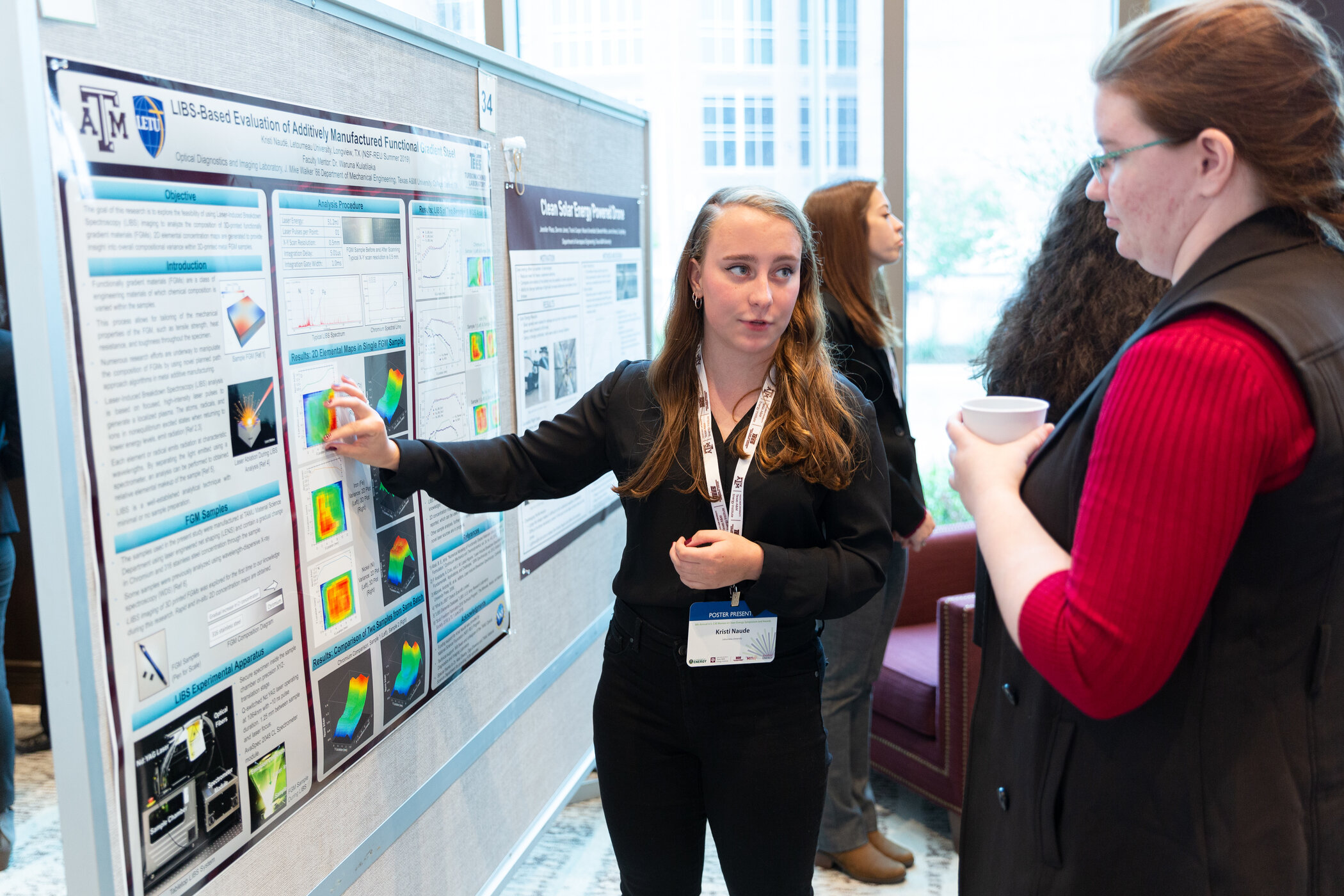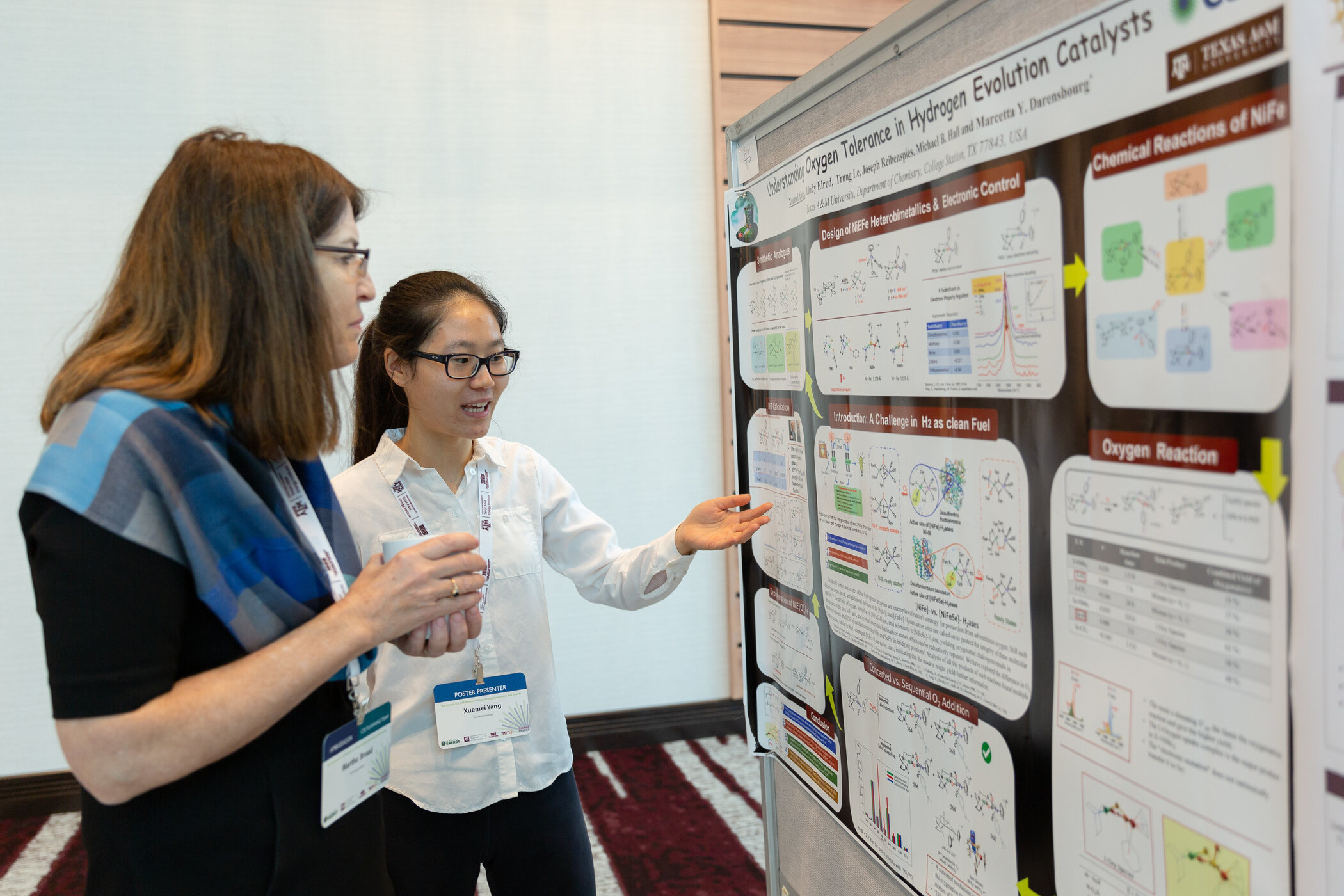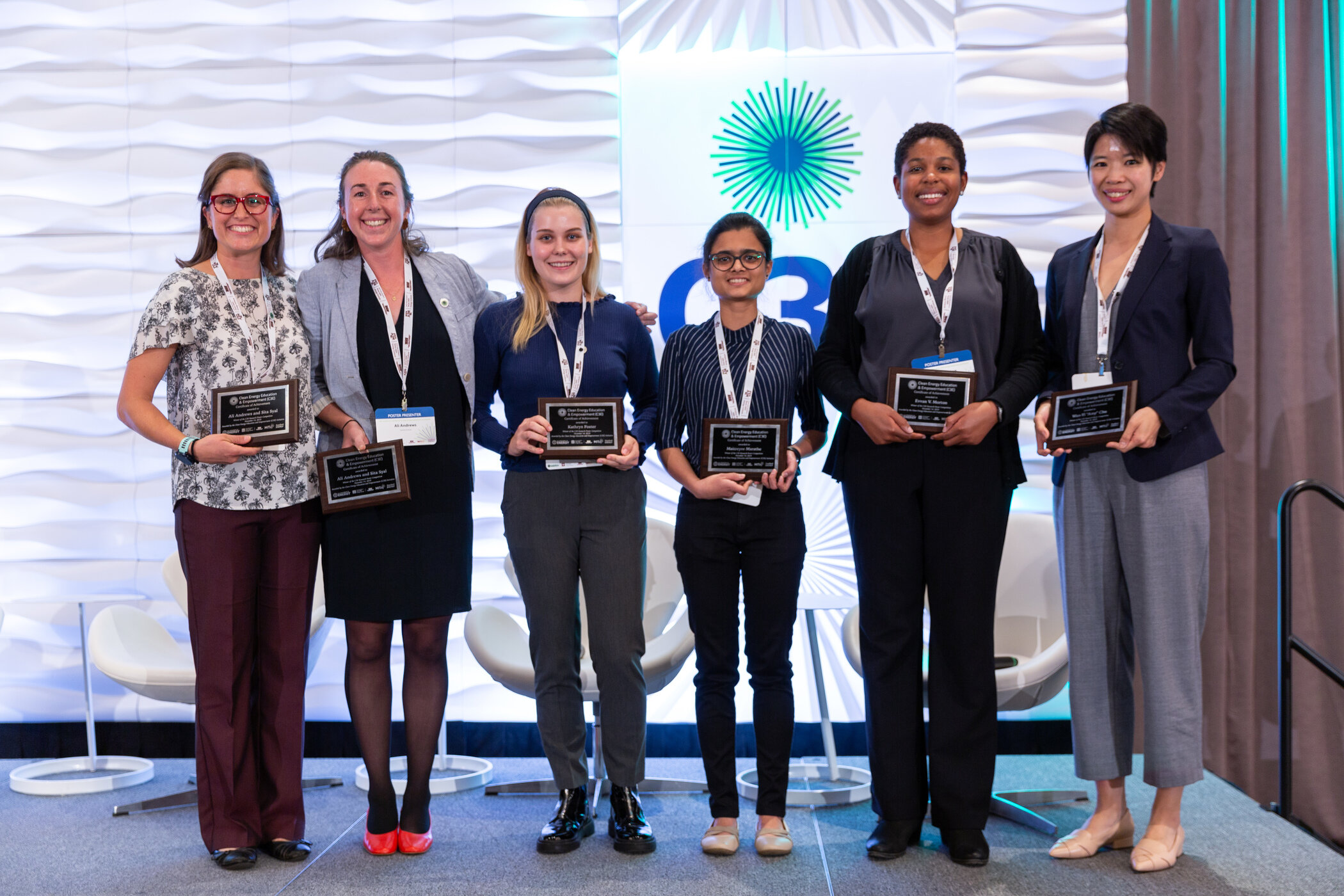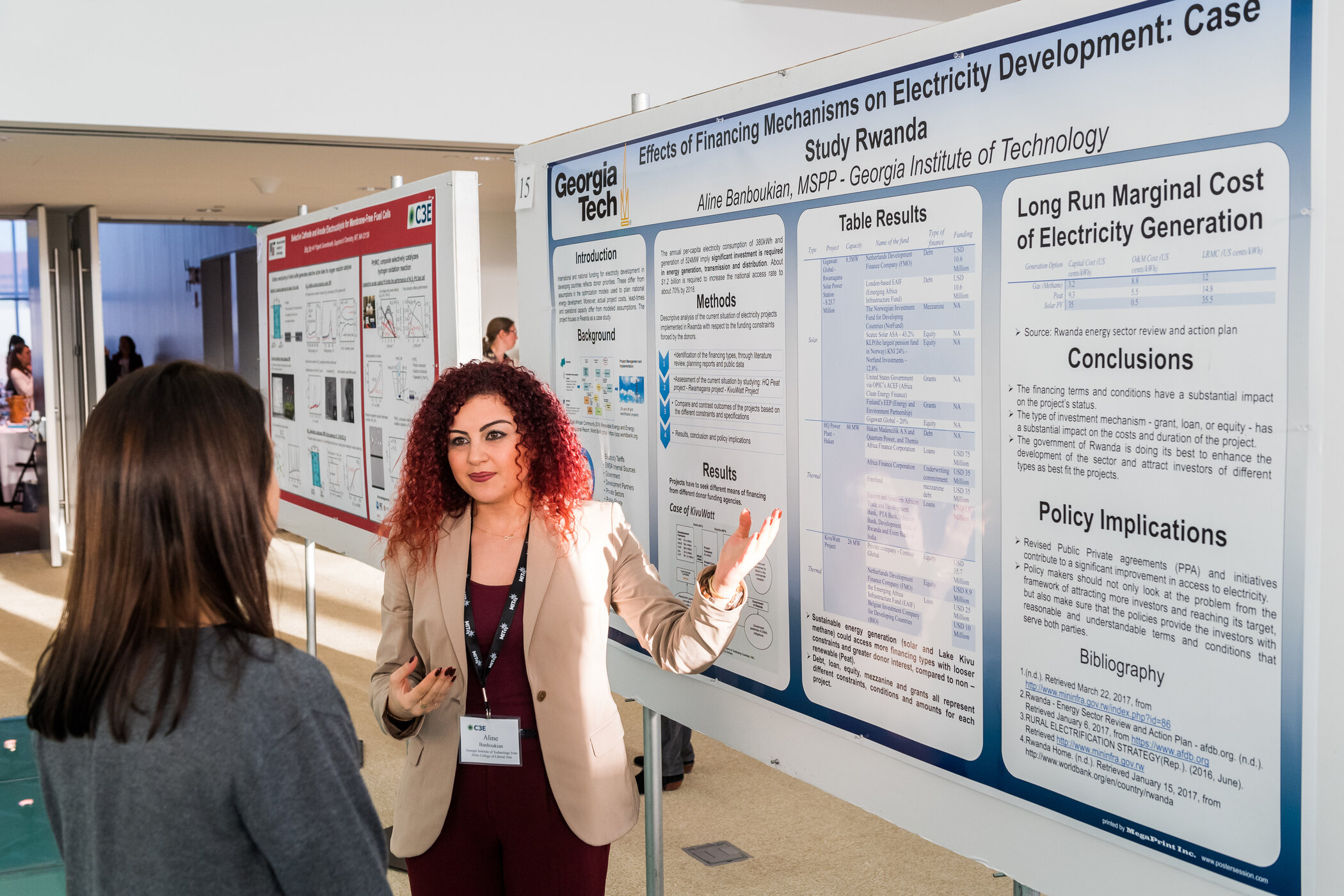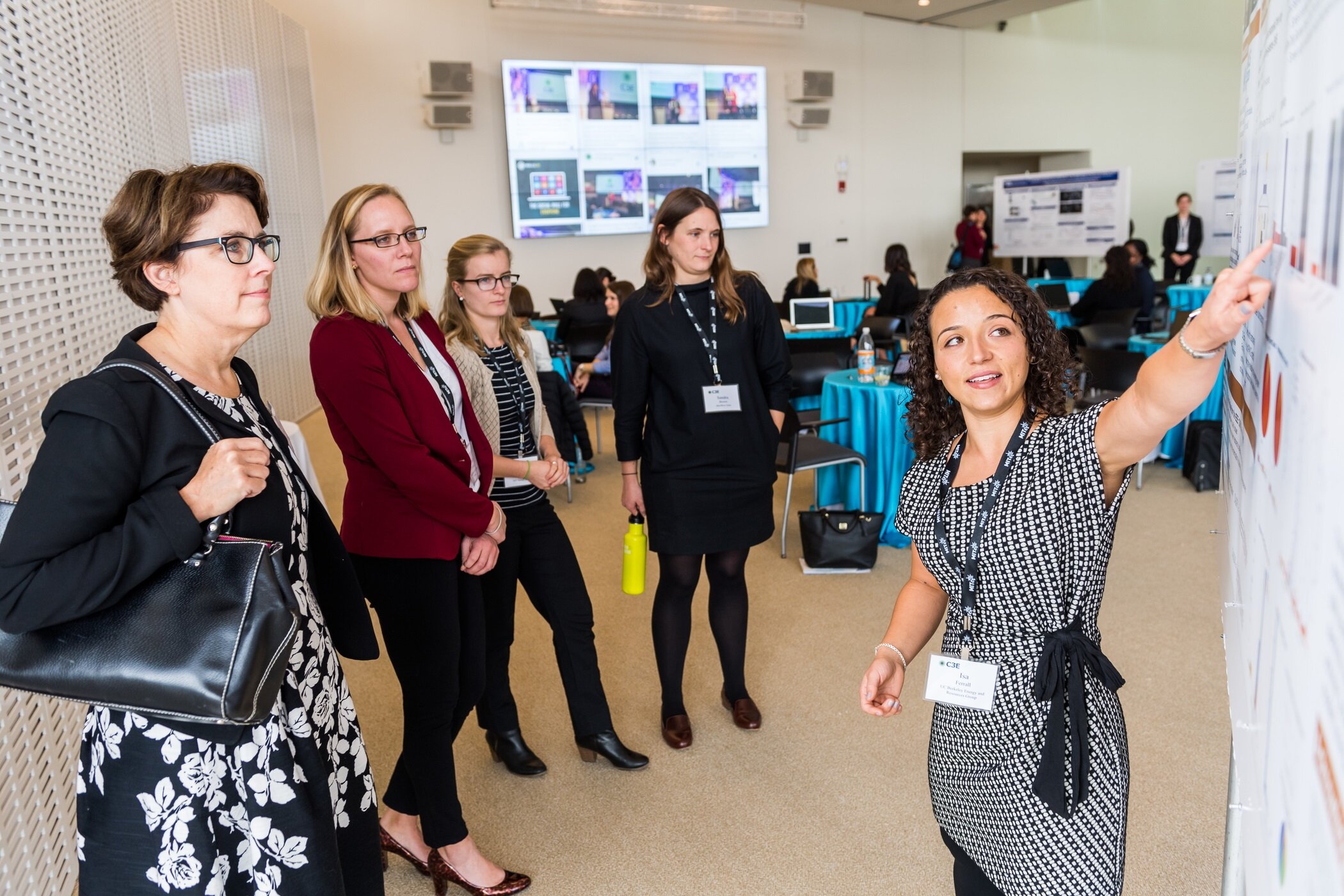The C3E Poster Competition is an opportunity for students and early-career researchers to compete for awards at the annual C3E Symposium. The poster competition exposes symposium attendees to cutting-edge research in a variety of energy fields. A poster committee with wide-ranging expertise will select the most compelling poster submissions for presentation at the symposium with an eye toward diversity of institution, topic, and discipline.
Past Poster competitions
**Denotes competition winner
2024:
Muneeza Ahmad, Arizona State University
Tracking Metal Halide Perovskite Stability with Mechanical Stress Measurements for Solar PV Applications
**Natalia Ali, Arizona State University
Redox-Active Metal Oxides for Sustainable H2 Production
Kayshavi Bakshi, Arizona State University
Scalable & Tunable Processing of Robust Solar Perovskites
Riddhi Bhagwat, Massachusetts Institute of Technology
Enhancing Subsurface Fluid Flow and Solute Transport Modeling Through Machine Learning: A Study of Fractured Rocks Using FracNet
**Anna Chen, University of California, Berkeley
Direct Methane to Methanol Conversion over Molybdenum-Based Catalysts
Youyeon Choi, Massachusetts Institute of Technology
Achieving Higher Power Density SMR Design Using an Innovative Nuclear Fuel
Jensen Coonradt, NASA CCRI and Massachusetts Institute of Technology
White Roofing and Vegetation Impact on Urban Heat Islands and Energy Efficiency
Amelia Dogan, Lawrence Livermore National Laboratory
Assessing Cybersecurity for Distributed Energy Resources (DERs)
Julia Dressel, Stanford University
Cobaltocene Mediated Electrocatalytic Carbonyl Reduction
Sarah Driscoll, Vanderbilt University
Chemical and Physical Effects of Gamma Irradiation on Potential Organic Coolants for Nuclear Reactors
Tânia Ferreira, Stanford University
High-Fidelity Simulations of Jet A and H2 Contrails
Jazmyn Fuentes, North Carolina State University & Coastal Studies Institute
Utilizing Technology for Renewable Energy and Climate Education
Lisa Fung, Stanford University
Optimizing California's Renewable Energy Portfolio using Power System Supply, Demand, and Price Forecasts
Ella Gersack, Massachusetts Institute of Technology
Carbon-Cement Supercapacitors: Long-Lasting Energy Storage Solution
**Rebecca Grekin, Stanford University
The Hidden Energy Costs of "Set it and Forget it" Parameters in Heating, Ventilation, and Air Conditioning (HVAC) Operations
Annie Hu, Pacific Northwest National Laboratory
Analysis of Energy Grid Impact on Future Housing
Chenxi Hu, The University of Hong Kong
Decision-Dependent Resilience Enhancement for Distribution Systems Against Endogenous Wildfires
Rayna Hylden, Arizona State University
Stabilizing Perovskite Solar Cells for Commercial Use
Shatakshi Iksha, Arizona State University
Evaluating the Flexibility and Durability of Perovskites Films on Plastic Substrates with Natural Polymer Additives
**Can (Rachel) Jiang, Massachusetts Institute of Technology
Unlocking Geothermal Potential: High Temperature (HT) GaN Device Characterization
Hyunhwa Kim, University of Illinois Urbana-Champaign
A Two-Echelon Bidirectional Energy Supply Problem with Uncrewed Electric Aerial and Ground Vehicles for Emergency Response Logistics
Iuliia Kukula, Arizona State University
Clean Hydrogen Potential for Carbon-Neutral Copper Mining
Jiarong Li, Harvard University
Reconsidering the Utilization of Photovoltaics in Deserts for the Scalable Decarbonization and Ecological Restoration
Tanya Masnyk, Purdue University
Solar-Powered Retrofit Improves Thermal Resilience of Residential Homes in Extreme Temperature Events
**Ashley McCullough, University of Wisconsin-Madison
Intersection of Chemical and Power Sectors: Device Design and Multi-Scale Scheduling to Assess Flexibility Remuneration Throughout the US
Kariana Moreno Sader, Massachusetts Institute of Technology
Decarbonizing Long-Haul Trucks Using Liquid Organic Hydrogen Carriers (LOHCs)
Trisha Ramadoss, University of California, Davis
What Drives Multi-EV Adoption?
Maha Shafaeen, University of California, Davis
Identifying Priority Communities for Electric Vehicle Investments
Aquila Simmons, Massachusetts Institute of Technology
Decarbonizing Natural Gas: Surface Tension of Graphite Tin Interfaces for Applications in High Temperature Methane Pyrolysis
Dorsa Talebi, Texas A&M University
Next Generation of Electric Powertrains for Electric Aircrafts
Grace Wei, University of California, Berkeley
Exploring the Thermodynamic Properties of LiMXCl4 Superionic Conductors
2023:
MATERIALS SYNTHESIS AND PROCESSING INNOVATIONS OF LITHIUM SULFUR BATTERIES UNDER INDUSTRY RELEVANT SCALES
Cassidy Anderson, University of Washington
POWER CONSUMPTION IN AN OFFSHORE AQUACULTURE FARM
Leah Buccino, Cornell University
INTEGRATED PLANNING METHODS TO IDENTIFY DAM PORTFOLIOS THAT MINIMIZE ENVIRONMENTAL AND CLIMATIC IMPACTS OF NEW AFRICAN HYDROPOWER
Anna Clark, Stanford University
RECYCLING OF ALUMINUM SCRAP BY SHEAR ASSISTED EXTRUSION
Mieka Clark, Pacific Northwest National Laboratory & Michigan Technological University
HYDROGEN REDUCTION AS A NOVEL APPROACH TO FORMIC ACID SYNTHESIS
India Cox, Massachusetts Institute of Technology
SURFACTANT-MODIFIED SILICA NANOPARTICLES FOR RARE EARTH ELEMENT SEPARATION VIA FROTH FLOTATION
Yuxuan Dai, University of Pennsylvania
A COMPREHENSIVE GRID IMPACT ANALYSIS OF DEVELOPING ZERO-EMISSION SUSTAINABLE AVIATION FUEL
Yifu Ding, Massachusetts Institute of Technology
CAN FUSION HELP DECARBONIZE THE US POWER SECTOR?
Amanda Farnsworth, Massachusetts Institute of Technology
ENERGY (IN)EFFICIENCY AND HEAT RESILIENCE IN BOSTON'S INCOME-RESTRICTED HOUSING
Lauren Higgins, Massachusetts Institute of Technology
OPTIMIZING U.S. STEEL PRODUCTION FOR CLIMATE GOALS
**Sydney Johnson, Massachusetts Institute of Technology
REAL-FLUID MODELING FOR SUSTAINABLE AVIATION FUELS
Lauren Kramer, Brown University
POTENTIAL FOR CLIMATE BENIGN DIRECT AIR CO2 CAPTURE WITH CO2-DRIVEN GEOTHERMAL UTILIZATION AND STORAGE (DACCUS)
Martina Leveni, The Ohio State University
QUANTIFYING RISK OF CASCADING FAILURES IN LARGE-SCALE HYDROGEN STORAGE SYSTEMS
Melissa Louie, Sandia National Laboratories
GEOSPATIAL DECISION SUPPORT TOOL FOR TRUCKING FLEET DECARBONIZATION
Danika MacDonell, Massachusetts Institute of Technology
UNDERSTANDING DESIGNER ELECTROCATALYSTS FOR ENERGY CONVERSION REACTONS: ADSORBED MOLECULES CAN BEHAVE LIKE METALS
Vennela Mannava, Massachusetts Institute of Technology
SALTY SEAS TO SUSTAINABLE STORAGE: PIONEERING SODIUM-ION BATTERIES DEVELOPMENT WITH AI AND COST-MODELLING
Mrigi Munjal, Massachusetts Institute of Technology
DATA-DRIVEN CHARACTERIZATION OF COOLING NEEDS IN A PORTFOLIO OF CO-LOCATED COMMERCIAL BUILDINGS
Aqsa Naeem, Stanford University
A HOLISTIC APPROACH TO SAFE AND SUSTAINABLE CARBON CAPTURE UTILIZATION AND STORAGE SUPPLY CHAINS
**Manar Oqbi, Texas A&M University
COAL RETIREMENT STRATEGIES IN INDIA: REPURPOSING COAL PLANTS INTO THERMAL ENERGY STORAGE
**Serena Patel, Massachusetts Institute of Technology
MODELING RADIOLYSIS EFFECTS IN FLINAK AND FLIBE MOLTEN FLUORIDE SALT
Adria Peterkin, Massachusetts Institute of Technology
PREDICTING TRANSPORT PROPERTIES OF ELECTROLYTES FOR DESIGN OF AQUEOUS ORGANIC REDOX FLOW BATTERIES
**Wilma Rishko, Pacific Northwest National Laboratory
ELECTROCATALYTIC CARBON DIOXIDE REDUCTION IN CAPTURE SOLVENTS
Sophie Rubashkin, Pacific Northwest National Laboratory
DEVELOPMENT OF A WAVE-POWERED INTEGRATED MULTI-TROPHIC AQUACULTURE FARM
Annie Stewart, Cornell University
UNDERSTANDING CATALYSIS THROUGH THE CONSTRUCTION AND STUDY OF AN ARTIFICIAL ENZYME
Regina Trevino, Pacific Northwest National Laboratory
AQUACULTURE, WAVE ENERGY CONVERTERS, AND OFFSHORE WIND TURBINES: A CO-LOCATION CASE STUDY
Olivia Vitale, Cornell University
INTEGRATED MODEL OF A FLOATING MARITIME NUCLEAR SYSTEM FOR AMMONIA PRODUCTION
Hanna Won, Massachusetts Institute of Technology
REAL-TIME OPTIMIZATION STRATEGY TO MINIMIZE SIMULTANEOUS HEATING AND COOLING
Min Gyung Yu, Pacific Northwest National Laboratory
COMPARING ENVIRONMENTAL IMPACT OF FUTURE SILICON SOLAR PHOTOVOLTAICS MANUFACTURING IN CHINA AND NORTH AMERICA
Luyao Yuan, Michigan State University
AIMING AT ZERO-CARBON EMISSION IN LITHIUM-ION BATTERY CATHODE PRODUCTION
**Chuwei Zhang, Massachusetts Institute of Technology
2022:
**Kristy Chan, Stanford University
Sodium Capacitive Deionization for In-Situ Fertilizer Production Using Urine
Sinclair Combs, Colorado School of Mines
Defect Studies in Halide Solid Electrolytes for High-Voltage Battery Applications
Clarissa Daniel, Stanford University
Piezoelectric Resonators for Efficient Power Conversion
Mathilde Fievez, Stanford University
Plasma-Curing Lowers the Energy Footprint of PV Manufacturing
**Sheila Gerardo, The University of Texas at Austin
From Waste to Resource: Mechanisms Dictating Rees Recovery from Coal Fly
Nanette Giron, The University of Texas at El Paso
Enhancing Worker Safety During Off-Site Construction of Energy-Efficient, Low-Carbon Exterior Envelope
Arezoo Hasankhani, Cornell University
Design and Path Planning of a Marine Hydrokinetic Turbine to Power Blue Economy
Camille Levine, University of Maryland, College Park
Identifying Human Failure Events for External Hazard Probabilistic Risk Assessment
**Sophia Ludtke, Harvard College
Technical Feasibility and Optimization of Utility-Scale Hybrid Solar-Wind Energy Systems on Texas Farms & Ranches
Sonia Martin, Stanford University
Electric Vehicle Green Charging: Marginal or Average Emissions Control?
Rebecca McCabe, Cornell University
Design Optimization of a Wave Energy Converter
Arshiah Mirza, University of Connecticut
Novel Machine Insulation Materials for Transportation Electrification Applications
Yasmeen Musthafa, TAE Technologies
Monitoring Impurities and Hydrogen Isotopes in the C-2w Field-Reversed Configuration Fusion Device
Aqsa Naeem, Stanford University
Characterization of Cooling Consumption in a Portfolio of Commercial Buildings
Jocienne Nelson, National Renewable Energy Laboratory
Epitaxial Growth of Weyl Semimetal Taas for Energy Efficiency and Renewable Energy Applications
Alice Nuz, New York University
Electrification Pathways for Ethylene Decarbonization and Economic Viability
Fabíola Pereira, IST-UTL/MIT Portugal
Modeling Islands Energy Systems – A Data Driven Approach
Manasa Perikala, IISc Bangalore India
Waste to White Light: Recycling Plastic Waste to Next Generation Artificial Lighting Sources
Isabelle Sato, TAE Technologies Inc.
2D Simulation of Experimental Fusion Plasma
Sarah Sausan, Stanford University
How to Design the Most Productive Geothermal Well? Development of Decision-Making Ml Algorithm for Finding Optimum Well Parameters in Enhanced Geothermal Systemsers in Enhanced Geothermal Systems
**Jing-Jing Shen, Harvard College (research from internship at Argonne National Lab)
Cavity Microelectrodes to Study Fuel Cell Fe-N-C Cathode Catalysts
Chelsea St. Germain, Idaho National Laboratory
Proteomic Profiling of Microalgae During Long-Term Ensiling Reveals Routes of Nutrient Cycling and Dark Adaptation
Kristen Susuki, University of California San Diego and National Renewables Energy Laboratories (NREL)
Meshfree Methods for Modeling Chemo-Mechanical Cathode Cracking in Li-Ion Batteries
Swapna Thorve, University of Virginia
High Resolution Synthetic Residential Energy Use Profiles for the U.S.
**Yiwen Wang, University of Massachusetts-Amherst
Characterizing Relatedness of Offshore and Onshore Wind Energy Using Patent Analysis
Haley Williams, University of California - Berkeley
Acid/Base Buffering Capacity in Molten Fluoride Salts
Ruolin Zhang, University of Illinois Urbana-Champaign
Community Charging Hubs in Multi-Unit Dwellings: Electric Vehicle Charging Management and Technoeconomic Assessment
Linghui Zhou, The Fletcher School of Law and Diplomacy & Columbia University
A Just Transition into the Green Economy: Healthy Indoor Environments and Housing Sustainability
2020:
Elizabeth Abraham, Texas A&M University at Qatar
Analysis of P3HT Photodegradation
Utkarsha Agwan, UC Berkeley
Electric Truck Charging Infrastructure: Investments and Impacts
Yogita Akhare, Prairie View A&M University
Novel Model Predictive Control for Fault Analysis of Electrical Machine Drives
Polina Brodsky, The Ohio State University
Modeling Lithium Plating to Achieve Fast Charging of Lithium ion Batteries
Julie Cook, Texas A&M University
A Decision-Making Tool for the Optimal Selection and Allocation of Renewable Energy Generation and Storage Systems
Remy Dhingra, Yale College
Championing Mini-Grids to Shrink Nigeria’s Energy Access Deficit
**Katherine Elbert, University of Pennsylvania
Designing Nanocrystal Surfaces for Accessing Metamaterials
Tessa Fong, Boise State University
Erosion Experimentation in Solar Power Systems
**T.M. Kelsy Green, University of Michigan-Ann Arbor
Radiation Tolerant Materials for Advanced Nuclear Reactors
Maha Haji, MIT
Development of a Platform for Expanding AUV exploRation to Longer ranges (PEARL)
Nora Hennessy, Stanford University
Carbon Emissions and Exposure to PM2.5 Due to Electricity Imports in the U.S.
Tasmin Hossain, North Carolina State University
Cellulosic Biofuel Supply Chain: A Nationwide Analysis
**Golnaz Isapour, MIT
Towards Power-free Sensors: Scalable Manufacture of Mechanochromic Materials based on Modular Assembly of Photonic Hydrogel Microspheres
Ashini Jayasinghe, Florida State University
Synthesizing Stable Actinide Intermetallic Materials for Nuclear Waste Storage
Sarah Khanniche, MIT
Accelerating the Clean Energy Revolution with Accelerated Nanomaterial Discovery
Sepideh Kianbakht, Colorado School of Mines
Shutdown Controller Design for SUMR Wind Turbine
Alison Knasin, University of Pennsylvania
Structural and Reactivity Studies of a Synthetic Model System for a Rare-Earth Containing Enzyme
Shivani Kozarekar, National Renewable Energy Laboratory
Molecular Dynamics Simulations of Polyvinyl Chloride for the Accurate Prediction of Novel Biobased Polymer Properties
Jennifer Lee, Harvard University
Designing Nanocatalysts for Renewable Energy Applications
Justine Lee, Stanford University
No One Size Fits All: Multiple Pathways to Success for Clean- and Hardtech Startups
Chloé Lerin, Oak Ridge National Laboratory
Heavy-Duty Natural Gas Engines, Using Pre-Chambers to Enable Clean and Efficient Internal Combustion Engines
Zhiye Li, Stanford University
Introduce New Structural Material to Reduce the Environmental Impacts of Buildings: Composites Derived from Fossil Fuels
Mei Luo, Illinois Institute of Technology
Calendar-life vs. Cycle-life Aging for Silicon Anode
**Elisabeth L. McClure, National Renewable Energy Laboratory
Pathway Towards Low-Cost, High-Efficiency Solar Cells by Dynamic Hydride Vapor Phase Epitaxy
**Laura E. Mundt, SLAC National Accelerator Laboratory
Stability in Metal Halide Perovskite Solar Cells—A Matter of Mixing
Alex Nutkiewicz, Stanford University
A Hybrid Modelling Approach to Characterize the Impact of Urban Context on Building Energy Retrofits
Caitlin Seed, North Carolina State University
Tribotronic Control and Energy Storage Attributes of Metal-oxide Nanofluid Interfaces
Sivaranjani Seetharaman, Texas A&M University
A Privacy-Preserving Framework for Demand Response from Residential Thermal Loads
Kelly Smith, Tufts University
Offshore Wind Grid Integration Mapping in the Northeast U.S.
**Natasha Stamler, MIT
Weatherproofing of New York City Public Housing for Energy Savings
Veenasri Vallem, North Carolina State University
New Approach for Oceanic Energy Harvesting
**Chelsea Wilson, North Carolina A&T University
Development of a Novel Oscillating Water Column Using Computational and Experimental Methods
2019:
**Ali Andrews and Sita Syal, Stanford University
Community Co-design in Renewable Energy Project Development
**Wan-Yi Chu, University of Pennsylvania
A Strategy to a Carbon-neutral Cycle of the Production and Use of Methanol
**Kathryn Foster, UC Santa Barbara
Winds of Change: Assessing Wind Energy Efficiency in Complex Terrain
**Maitreyee Marathe, University of Wisconsin-Madison
Intelligent Solar Home System
**Evvan Morton, Arizona State University
Emissions Trading and Climate Change: The Consequences of Pairing Old Solutions with New Problems
2018:
**Jill Ferguson, American Council for an Energy-Efficient Economy
Energy Efficiency in Rural and Small-town America
**Samantha Johnson, Pacific Northwestern National Lab
Using Computational Methods to Design Ammonia (NH3) Oxidation Catalysts for Use in Fuel System
**Sarah Khanniche, MIT
Fighting Climate Change with ab initio Calculations: The Example of Cylopentanone as a Promising Biofuel Candidate
**Claudia Okonkwo, Georgia Institute of Technology
Hydrogen Sulfide Capture Using Amine Modified Mesoporous Oxides
**Simone Speizer, Stanford University
Quantifying Methane Emissions from Storage and Tankless Natural Gas Water Heaters in Bay Area Homes







